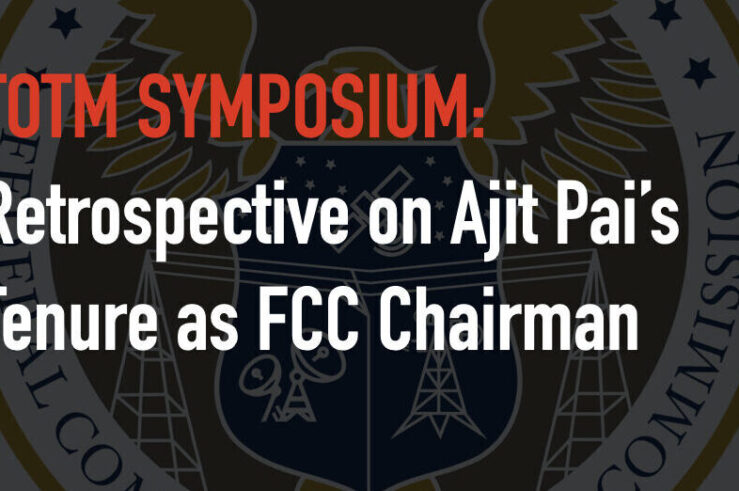Showing archive for: “Corporate Governance”
Broadband Deployment, Pole Attachments, & the Competition Economics of Rural-Electric Co-ops
In our recent issue brief, Geoffrey Manne, Kristian Stout, and I considered the antitrust economics of state-owned enterprises—specifically the local power companies (LPCs) that are government-owned under the authority of the Tennessee Valley Authority (TVA). While we noted that electricity cooperatives (co-ops) do not receive antitrust immunities and could therefore be subject to antitrust enforcement, we ... Broadband Deployment, Pole Attachments, & the Competition Economics of Rural-Electric Co-ops
Old Ideas and the New New Deal
Over the past decade and a half, virtually every branch of the federal government has taken steps to weaken the patent system. As reflected in President Joe Biden’s July 2021 executive order, these restraints on patent enforcement are now being coupled with antitrust policies that, in large part, adopt a “big is bad” approach in ... Old Ideas and the New New Deal
FTC Competition Rulemaking Flunks a Cost-Benefit Test
There is little doubt that Federal Trade Commission (FTC) unfair methods of competition rulemaking proceedings are in the offing. Newly named FTC Chair Lina Khan and Commissioner Rohit Chopra both have extolled the benefits of competition rulemaking in a major law review article. What’s more, in May, Commissioner Rebecca Slaughter (during her stint as acting ... FTC Competition Rulemaking Flunks a Cost-Benefit Test
Dynamic Merger Efficiencies: The Case of Pharmaceutical Markets
The recent launch of the international Multilateral Pharmaceutical Merger Task Force (MPMTF) is just the latest example of burgeoning cooperative efforts by leading competition agencies to promote convergence in antitrust enforcement. (See my recent paper on the globalization of antitrust, which assesses multinational cooperation and convergence initiatives in greater detail.) In what is a first, ... Dynamic Merger Efficiencies: The Case of Pharmaceutical Markets
The (Conventional) 5G Chairman
Chairman Ajit Pai prioritized making new spectrum available for 5G. To his credit, he succeeded. Over the course of four years, Chairman Pai made available more high-band and mid-band spectrum, for licensed use and unlicensed use, than any other Federal Communications Commission chairman. He did so in the face of unprecedented opposition from other federal ... The (Conventional) 5G Chairman
The Forgotten Strand of the Anti-Monopoly Tradition in Anglo-American Law
Admirers of the late Supreme Court Justice Louis Brandeis and other antitrust populists often trace the history of American anti-monopoly sentiments from the Founding Era through the Progressive Era’s passage of laws to fight the scourge of 19th century monopolists. For example, Matt Stoller of the American Economic Liberties Project, both in his book Goliath ... The Forgotten Strand of the Anti-Monopoly Tradition in Anglo-American Law
The Antitrust Prohibition of Favoritism, or the Imposition of Corporate Selflessness
It is my endeavor to scrutinize the questionable assessment articulated against default settings in the U.S. Justice Department’s lawsuit against Google. Default, I will argue, is no antitrust fault. Default in the Google case drastically differs from default referred to in the Microsoft case. In Part I, I argue the comparison is odious. Furthermore, in ... The Antitrust Prohibition of Favoritism, or the Imposition of Corporate Selflessness
For the Bar, Competition is Always “Unethical”
State bar associations, with the backing of state judiciaries and legislatures, are typically entrusted with a largely unqualified monopoly over licensing in legal services markets. This poses an unavoidable policy tradeoff. Designating the bar as gatekeeper might protect consumers by ensuring a minimum level of service quality. Yet the gatekeeper is inherently exposed to influence ... For the Bar, Competition is Always “Unethical”
Would You Rather: Merger or Nationalization?
While much of the world of competition policy has focused on mergers in the COVID-19 era. Some observers see mergers as one way of saving distressed but valuable firms. Others have called for a merger moratorium out of fear that more mergers will lead to increased concentration and market power. In the meantime, there has ... Would You Rather: Merger or Nationalization?
First Amendment Conflict of Visions Redux: The Case of Facebook’s Oversight Board and the Threat of Antitrust Action
In the wake of the launch of Facebook’s content oversight board, Republican Senator Josh Hawley and FCC Commissioner Brendan Carr, among others, have taken to Twitter to levy criticisms at the firm and, in the process, demonstrate just how far the Right has strayed from its first principles around free speech and private property. For ... First Amendment Conflict of Visions Redux: The Case of Facebook’s Oversight Board and the Threat of Antitrust Action
Let’s (NOT) Stop All the Mergers: The Case for Letting the Agencies Do Their Jobs
Never let a crisis go to waste, or so they say. In the past two weeks, some of the same people who sought to stop mergers and acquisitions during the bull market took the opportunity of the COVID-19 pandemic and the new bear market to call to ban M&A. On Friday, April 24th, Rep. David ... Let’s (NOT) Stop All the Mergers: The Case for Letting the Agencies Do Their Jobs
Privacy in the Time of Covid-19
I type these words while subject to a stay-at-home order issued by West Virginia Governor James C. Justice II. “To preserve public health and safety, and to ensure the healthcare system in West Virginia is capable of serving all citizens in need,” I am permitted to leave my home only for a limited and precisely ... Privacy in the Time of Covid-19











